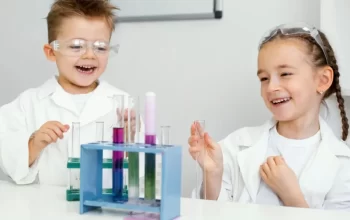National Science Week, Australia’s annual celebration of science and technology will be beginning on the 12th of August 2023 and ending on the 20th of the same month with the theme: Innovation: Powering Future Industries! For early childhood education learning environments, this is a great opportunity to extend upon young children’s fascination and curiosity about the world around them.
What is STEM?
The acronym STEM stands for Science, Technology, Engineering and Mathematics. STEM experiences aim to integrate conceptual knowledge and processes of thinking across two or more domains in an activity of interest, ritual or routine that is significant and relevant to the lives of young children. At Little Stars Early Learning & Kindergarten, our approaches for facilitating STEM education in the early years align best with inquiry-based or project-based learning experiences, where opportunities for shared learning experiences between children and educators can be co-constructed and built upon over time.
How we help young minds foster a love for science
At Little Stars, our educators provide open-ended materials that promote curiosity, creativity, and innovation. They collaboratively discuss, plan, draw, build and test out children’s ideas. Based on the children’s interests and ideas, educators then implement inquiry-based learning experiences. These learning experiences aim to build on each child’s individual strengths, knowledge, and skills.
During the learning experiences, our educators will observe how children are involved in scientific thinking and thinking about science. How children engage with resources, as well as their questions, wonderings, hypotheses, and ideas. They also make themselves available to co-play and co-investigate with children frequently.
Concepts of STEM in early learning
At our centres, educators integrate STEM concepts into children’s everyday play themes and education practices to further promote their love of science.
Science Exploration of movement energy, including forces such as pulling and pushing, speed of movement, temperature, density, floating, and sinking
Exploration of the needs of plants and animals
Curiosity with natural phenomenon, such as weather, gravity, night and day, tides, and seasons
Exploration and investigation of natural, edible, and man-made materials through cooking, arts and crafts and outdoor play experiences
Technology Incorporation of, and manipulation of materials
Using digital technologies to enhance and extend upon play-based open-ended learning experiences
Engineering Understanding of how things work through tinkering
Designing and creating structures
Mathematics Counting and using numbers
Time, size, distance and quantities
Informal measurement.
Movement through space
At Little Stars, our educators create play-based and child-led early childhood STEM learning experiences to enable the development of inquiry skills and understandings necessary to navigate and thrive in an ever-changing world. They revisit their daily routines and provide feedback, sharing ideas with children during play. We teach children about equality and inclusivity in STEM with our educators I also introducing elements of Aboriginal and Torres Strait Islander culture and perspectives relevant to weather patterns, caring for country, sourcing food, and creating shelter.
We enable children to investigate, explore and take calculated risks, by encouraging them to ask and respond to questions about the real world, and by being active participants in their own learning.

